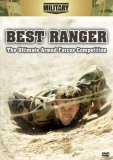| Reviews & Columns |
|
Reviews DVD TV on DVD Blu-ray 4K UHD International DVDs In Theaters Reviews by Studio Video Games Features Collector Series DVDs Easter Egg Database Interviews DVD Talk Radio Feature Articles Columns Anime Talk DVD Savant Horror DVDs The M.O.D. Squad Art House HD Talk Silent DVD
|
DVD Talk Forum |
|
|
| Resources |
|
DVD Price Search Customer Service #'s RCE Info Links |
|
Columns
|
|
|
Best Ranger
I accept the fact that as a Ranger my country expects me to move farther, faster, and fight harder than any other solider.
Chronicling the physically grueling, mentally exhausting three day 2005 Best Ranger competition, The Military Channel's Best Ranger disc is an exhilarating look at the Army's elite Ranger corps, and the fearsome contest they submit themselves to each year. Forget your silly "extreme sports" challenges on ESPN2; the punishing Best Ranger contest leaves them all in the dust, and through interviews and profiles of the contestants, gives the viewer a renewed appreciation of these genuine American heroes.
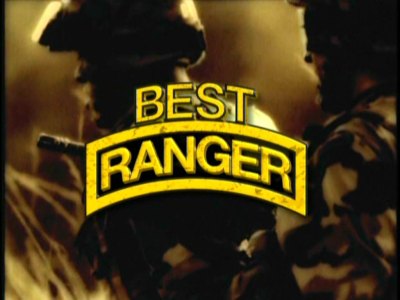
Started in 1982, the Best Ranger competition was conceived as not only a celebration of the famed Army Rangers' history, but as a suitably tough, arduous challenge that separates, as one soldier puts it, "the rock stars from the groupies." This is pure competition designed to weed out the weaker members, and elevate the strongest until only one two-man team survives. There's none of that spurious "everyone wins here" mentality. Of course, it's a victory in its own right just to finish the contest. But bragging rights - and beautiful Colt .45 Gold Cup pistols - go to only one team: the winning team. And it's an awesome achievement that the winners are justifiably proud to claim as their own.
Taking place at the famed, massive Fort Benning in Georgia, the home of the U.S. Army Rangers, the Best Ranger contest involves two man teams from all branches of the Army. Spanning three days, the competition consists of arduous physical and tactical challenges that push the contestants to the very limits of their endurance. It really is quite humbling to see the tasks these soldiers submit to, in an effort to honor their service, and to call themselves the very best. While each individual obstacle or exercise seems tough enough to wipe out the average weekend athlete, what's truly amazing about the Best Ranger competition is that these events keep coming, hour after hour, all day long, day after day, for a total of 60 hours - with limited food and sleep for the contestants. Each event is scored, and any failure to execute a particular course or tactical maneuver correctly by the soldiers is rewarded with penalty points. At the end of the three days, the team with the most points wins; it's as simple as that. They don't rest; they don't stop. These soldiers keep going long past the point most athletes would quit.
And the tasks they're expected to master would give pause to most extreme sports enthusiasts, particularly when they're combined with tactical feats of military training that test the soldiers' mental as well as physical endurance. Day One of the competition is designed to eliminate at least half of teams - which it more than succeeds in doing. The famed, dreaded Malvesti Obstacle course starts the competition, with a gut-busting combination of chin-ups, cargo net climb, confidence climb (over a huge, precarious obstacle), the horizontal ladder, chin ups, followed by a long slog through the worm pit, a muddy, shallow pit strung with barbed wire just above the crawling soldiers' heads. Soaking wet from this event, the soldiers head for the Run, Swim, Run event, where they must first run a mile, then swim (in the same heavy clothes and boots) 200 meters, only to climb out of the water and run another two full miles. At the end of the two mile run, they're met with another challenge: a 100 meter buddy carry, where each teammate must carry the other for 50 meters - at a full run. Then, the Run, Swim, Run event ends with push-ups and pull-ups to the beat of a metronome, with the soldiers doing as many as they can before exhaustion stops them. Again, remember: this is just the morning events, with no breaks.
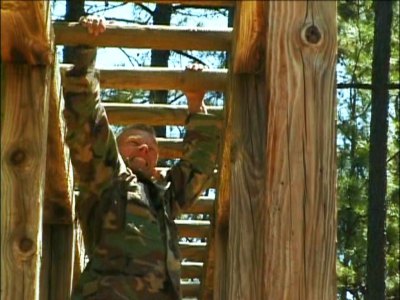
Immediately following the Run, Swim, Run event, the soldiers enter the Bayonet Assault Course, where they must successfully negotiate the course, performing all combat moves in the correct order, or face penalty points (as with all the events). Next, the soldiers must then engage in Urban Operations, a tactical exercise where they must enter a simulated town, and take out enemy combatants while dealing with guns that are deliberately rigged to randomly jam on them. Next, there's the Target Slot Jump, where the soldiers must parachute out of a helicopter, make a pinpoint landing, and stow their gear. Following that, there's an event on the machine gun range where the soldiers must fire at specific targets over 800 meters away, without hitting off-limits targets. And finally, the most dreaded event of the day, the Road March, a six hour forced march that can span anywhere from 18 to 25 miles, while the soldiers field 65 pound rucksacks. Known as "The Separator," this Road March effectively wipes out the weaker teams (the soldiers are followed by the "Blue Bird," a slow moving bus that picks up the fallen contestants), and severely debilitates the remaining teams. Often going until sun-up, it's important to remember that all of the events I have just described take place all on the very first day of the competition, with little or no breaks in-between the events, and little food and water as comfort for the exhausted soldiers. Even after all of that, there's still two more punishing days of events ahead.
Days Two and Three prove to be just as punitive in the abuse heaped on the soldier contestants. Day Two has the Ranger Day Stakes, which include various small arms competitions, the First Responder course, where the teams must treat and rescue a dummy soldier while they're under realistic enemy fire, the Grenade Assault course, the Tomahawk throw (which celebrates the first "Rangers" from the French-Indian Wars), the physically savage Prusik Climb (a sixty foot rope must be scaled, with a repel down from the tower), and the nighttime event Land Navigation, Night Orienteering, where the already shaky soldiers must exercise their logic in identifying and tagging various targets in the pitch dark rugged terrain. Day Three includes the famed Darby Queen obstacle course, which has 26 various obstacles for the soldiers to navigate, the Water Confidence event, where various obstacles are negotiated from great heights, and the Helocast and Swim, where the soldiers drop from a copter, swim along with their (hopefully) waterproofed rucksacks, followed by a two mile buddy run with the packs. Three days. 60 hours. Little or no sleep or food. And it's finally over.
Watching the Best Ranger competition, I was struck not only by the truly frightening level of intensity of the three day event, but also by the pride and accomplishments - and overriding patriotism -- of the soldiers that competed. Watching these well-spoken, intelligent, fiercely determined and focused soldiers, I wondered what kind of person willingly chooses this kind of life. Despite a vile, scurrilous "joke" uttered some months ago about only less-intelligent soldiers being sent to Iraq, it was apparent watching Best Ranger that these talented, focused men - many of whom have recently served in the Middle East conflict -- could easily be at the top of any civilian profession they might have chosen. But they chose to serve their country instead, a decidedly unglamourous life with little material reward. So the obvious pride and confidence they express for their country during the Best Ranger event is a poignant and inspirational reminder of how much we owe these voluntary protectors of our freedoms. The contestants that are profiled in the Best Ranger competition are Captain Marcus Messerschmitt, Captain Frederick Ahern, Captain Corbett McCallum, Sergeant First Class Gerald Nelson, Master Sergeant James Moran, Sergeant First Class Walter Zajkowski, Second Lieutenant Scott Paterson, First Lieutenant Benjamin Morgan, Major Liam Collins, Major Frank Sobchak, Sergeant David Robbins, Staff Sergeant Valentino Dezaldivar, Staff Sergeant Robert Willis, Sergeant Andrew Spain, Captain Scott Wence, Captain Michael Squires, Sergeant Johnny Craver, Staff Sergeant Travis May, Sergeant First Class Brent Myers, and Captain Brandon Cates. Rangers lead the way!
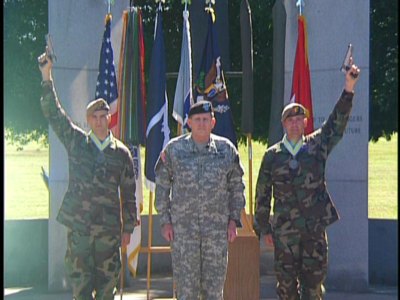
Here are the 3, 43-minute episodes of Best Ranger, as described on the DVD case:
Day One
Twenty-three two-man Ranger teams descend on Fort Benning, Georgia, for the start of a taxing, three-day competition. As the men prepare for the first day's events -- including marksmanship, a spot jump contest and a physical training test -- a passionate crowd of family, friends and fans gathers to cheer them on. And while each man wants to get off to a fast start, the key is to maintain a consistent level of performance throughout the competition's 60 continuous hours.
Day Two
It's Day Two, and the original 23 teams have been whittled down to just a dozen. With the conclusion of the grueling 21-mile road march, the men prove their mental acuity in a series of tactical tests, including weapons assembly, a medical first responder, grenade assault course, stress shoot and the infamous Prusik climb. But each of these pales in comparison to the second day's final event: the land navigation and night orienteering course.
Day Three
The final day of competition is here. After the conclusion of the 12-hour land navigation and night orienteering event, the remaining teams take on the sprawling 26-obstacle Darby Queen course. From there, it's time to make a splash in the water events -- including the Helocast and water confidence test. Finally, the teams put everything they have left into the two-mile buddy run.
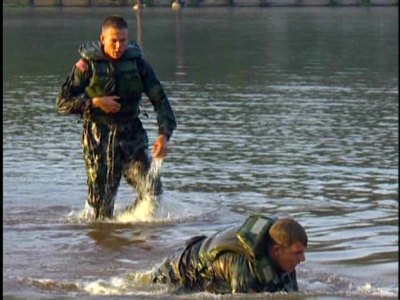
The DVD:
The Video:
Some of the video footage of the Best Ranger competition leaves a little to be desired, with some shaky hand held footage that can be distracting. The full frame transfer does have some compression issues in the busier scenes, but overall, it's a fair video image.
The Audio:
The Dolby Digital English 2.0 stereo soundtrack is adequate.
The Extras:
There are no extras for Best Ranger.
Final Thoughts:
Physically and mentally grueling, torturous, and ultimately exhilarating, the Best Ranger competition is an awesome testament to the physical and mental prowess of the Army's elite fighting group. The taxing contest itself is exciting, and the intelligent, focused, patriotic volunteer soldiers profiled here are inspirational role models for us all. I highly recommend Best Ranger.
Paul Mavis is an internationally published film and television historian, a member of the Online Film Critics Society, and the author of The Espionage Filmography.


|
| Popular Reviews |
| Sponsored Links |
|
|
| Sponsored Links |
|
|
| Release List | Reviews | Shop | Newsletter | Forum | DVD Giveaways | Blu-Ray | Advertise |
|
Copyright 2024 DVDTalk.com All Rights Reserved. Legal Info, Privacy Policy, Terms of Use,
Manage Preferences,
Your Privacy Choices | |||||||









